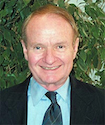
Noel G. Watson, who pushed Jacobs Engineering Group to be a diversified global industry powerhouse while serving twice as CEO, died suddenly on Aug. 11 at age 82. In announcing his death, the engineer-contractor and tech services firm did not disclose the cause, believed to be a heart attack, say industry sources with knowledge of the event.
A 57-year firm veteran, Watson was CEO from 1992 to 2006, and ran it as executive chairman in 2014-2015.
“Noel was deeply important to me as the company’s historic leader, as well as being a pivotal influence in an industry that was new to me." Steven Demetriou, chairman and CEO since 2015 and a former aluminum company chairman and CEO, told ENR. "Noel established the foundation of the global company that Jacobs is today."
Watson, a degreed chemical engineer, was recruited by Jacobs founder Joseph J. Jacobs, who started the firm as a one-man operation in 1947 and died in 2004. Watson was his predecessor’s third choice for CEO, following two outsiders “who didn’t work out,” Murli Tolaney, chairman emeritus of design-builder MWH Global and a close associate, says Watson told him.
Both MWH and Jacobs had been based in Pasadena Calif. Jacobs now is Dallas-based and MWH is headquartered in Broomfield, Colo.
“He had a tremendous impact on Jacobs,” says Tolaney, whose firm was acquired by Canada design giant Stantec in 2016.
"Noel was a leader with a clear vision for Jacobs. He successfully grew the company with a strategy that he was willing to openly share—an unwavering commitment to customers, cost efficiency and growth through accretive M&A," says Charles Harrington, chairman and CEO of Parsons Corp., also based in Pasadena. "Through this strategy he built a loyal following of customers and employees alike. He will be truly missed by many."
Demetriou terms Watson "the leader who set about leveraging the strength of knowledge and leadership we had across many disparate offices to create an organization greater than the sum of those parts," adding that he "steered the company’s growth seven-fold, from $1 billion to more than $7 billion in revenue, with corresponding profit increases, during his tenure."
Watson gained an industry reputation for a relentless bottom-line focus before his final retirement in 2017.
“Don’t talk about headcount, don’t talk about sales. Nothing counts in the end except the bottom line,” Watson said in a 2013-published book, The Wisdom of Titans. by William Ferguson.
In a 2002 ENR article, Watson said he "absolutely loved" quarterly scrutiny of the publicly held firm's results and termed new financial scrutiny under the just-enacted Sarbanes-Oxley law, “a public demonstration of personal responsibility.”
Jacobs on Aug. 6 reported revenue of nearly $13.5 billion for the 12 months ending June 30. Per-share net earnings for its third quarter rose 150% year over year.
Watson was self-effacing and largely avoided industry limelight, but he served as Jacobs’ key link to clients. “I get an absolutely unfiltered version of what we’re doing for them,’’ he said in a 2000 ENR company profile.
"Noel was universally respected ... most notably for the tireless passion, integrity and sense of practicality he brought to forge trust and to build longstanding relationships" with clients, employees, retirees and shareholders, says Demetriou.
But Watson faced challenges in the cultural integration of privately held engineer Sverdup after its 1999 acquisition, as well as in managing through a 2005 Texas refinery explosion that killed 11 employees of Jacobs and its nonunion unit JE Merit Constructors. Watson’s intended move into nuclear power through a buyout of Stone & Webster Corp. failed, but Jacobs last year became a 74,000-employee giant in buying environmental and infrastructure services firm CH2M for about $3 billion.
Observers point to “the Jacobs way” as a familiar Watson mantra that defined the firm’s culture in his era, even if it lagged in workplace diversity and embrace of technology.
But “Noel was a true icon of the industry—a straight shooter and a tough competitor,” says Robert Prieto, former chairman of Parsons Brinckerhoff.






Post a comment to this article
Report Abusive Comment